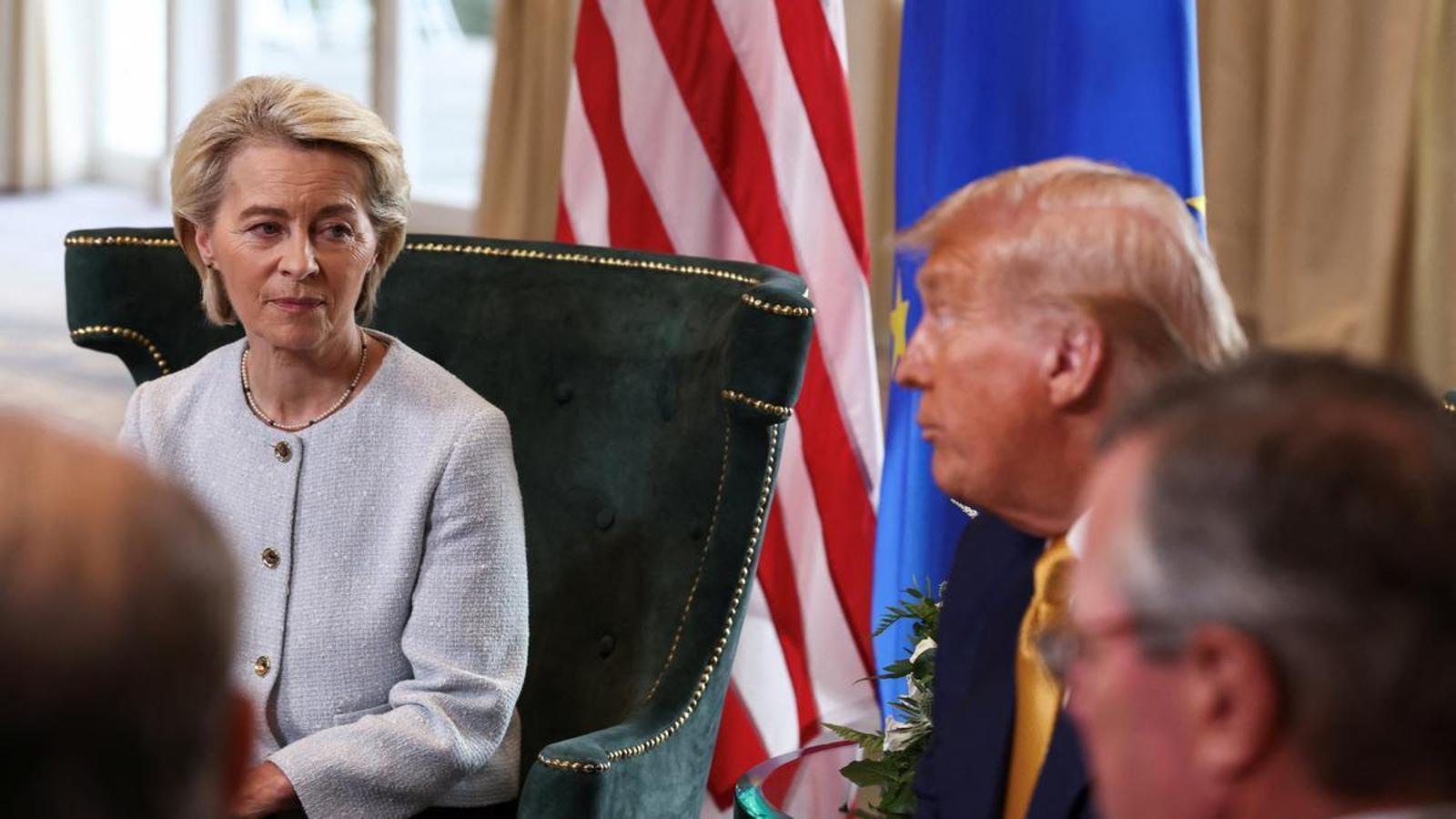An avoidable "disaster": Could Brussels have made a better deal with Trump?
The European Commission receives criticism for its negotiating strategy with Washington.


Barcelona"Those who do not go together are hung separately" ("Those who don't hang together get hung separately"). This is how a European diplomat expressed himself in the Financial Times about thetrade agreement between the European Union and the United StatesThe phrase recalls the need for the Twenty-Seven to unite before Washington to close a satisfactory pact, with the added irony that it is a quote from a founding father of the United States, Benjamin Franklin, who uttered it during the conflict between the thirteen American colonies and the British Crown that led to the United States' declaration of independence in 1776. During her appearance on Sunday in Scotland with US President Donald Trump, the president endorsed the agreement, which leaves tariffs on European exports to the US at 15% and imposes a long, multi-million dollar list of unspecified expenses and investments that the EU will have to carry out in the US. The following day, however, arose amid an avalanche of criticism of the agreement from member states, employers' associations, and analysts. The continent's press, like some governments, spoke of European "submission" to Washington.
How much room did von der Leyen have to negotiate? The answer is complex, but everything points to more. In fact, the main criticism is that Brussels was too soft on Trump from the start. The agreement "is a disaster not so much in specific aspects of specific industries, but rather for what it represents," says Joan Ribas, a professor of economics at Pompeu Fabra University and an expert in international economics. "We have very quickly accepted a kind of blackmail," Ribas adds, referring to the role of the Europeans.
Lack of European aggressiveness
This is the main point. On April 2, Trump proclaimed from the White House the Liberation Day, in a surprising press conference In this session, he used a blackboard to outline the tariff increases he would impose on all countries (in the case of the EU, a total of 30%). With the reaction of the stock markets, complaints from business leaders (including his then-ally, Elon Musk), and the reactions of all the affected governments, it took the US president exactly one week to put the tariffs on hold and leave a lower general one of 10%.
Brussels had announced a response tariff package, but seeing that Trump was backing down, it withdrew it and began negotiating without any weapons in its hands, accepting from the outset the general 10% and additional tariffs on the automotive, steel, and aluminum sectors, key in Europe. From then on, the EU negotiating team, led by the eternal commissioner Maros Sefcovic and Von der Leyen herself followed Trump's statements.
On June 1, the American magnate raised the tariff to 50%, but put it on hold two days later until July 9. The day before the deadline expired, he announced that he would send a letter to Brussels explaining the new tariffs and on July 12, he announced that the tax would be increased to 30%, but put it on hold again two days later in order to reach an agreement before August 1, which is what happened.
In this context of Trump's statements, until last Thursday Brussels did not present a new tariff package in response in case there was no deal with Trump in the end. One fact that explains this is the difficulty in deciding which elements should be included in the agreement, as each European capital tried to prevent a second wave of tariffs approved in retaliation by Washington from impacting their national industries: chemical, French, Italian and Spanish, various food products (from cognac to olive oil, including ham and foie gras); machinery components, etc. The aggressiveness despite having before them a president known for his toughness and a public and notorious resentment against Europeans.
The contrast with Canada and China
This negotiating strategy contrasts with that of countries like Canada and China, which directly approved very aggressive tariffs in response to Washington. Only if Trump backed down and left them hanging would Ottawa and Beijing do the same. Negotiate. Canada is still in talks with Trump, and China closed a deal with 34% tariffs (they had once exceeded 100%). "It opened a path, but it required time and unity." Americans who are highly dependent on European markets, such as technology multinationals, with whom the European Commission is already engaged in a war over violations of competition rules. "BK_SLT_LNA~" bully "We have to answer him," adds the UPF economist, who believes that perhaps the EU would not have been able to negotiate alone, but "yes with a coalition." His opinion agrees with that of the former chief economist of the International Monetary Fund, the Frenchman Olivier Blanchard: "When the law of the jungle prevails, the weak are not stronger, whether alone or in a coalition with others," he said on the social network X.
The outcome of the agreement has not satisfied anyone beyond the offices of Von der Leyen and Sefcovic.
